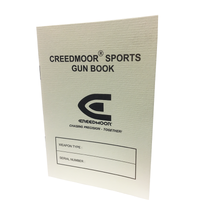Nov 1st 2024
The Benefits of Using Gun Books
June 16, 2023
By: John Teachey
Rifles shooters, regardless of their respective disciplines, are very good at keeping records. We record load data down to the slightest detail. We record dope, zeros, sight settings (pick your preferred nomenclature) to include data that is range-specific. We record stock settings, atmospheric conditions, light conditions, and nearly everything else you can imagine. But one area that is often overlooked is recording information on the rifle itself, specifically the round count, cleaning, and maintenance history. This data is arguably the most important of all, yet many shooters don't keep a gun book and collect this information.
Gun books are most commonly associated with the military, specifically match-conditioned firearms and sniper rifles. These books are a means for the shooter and the armorer tasked with maintaining the firearm to communicate. The shooter uses the firearm for its intended purpose and notes the number of rounds fired. The armorer uses this information for the purposes of preventative maintenance and also records their maintenance and gauging results in the book. For military units and marksmanship teams this is a must to ensure firearm readiness.
For individual shooters, not affiliated with a military team or serving in a military unit, we act as the shooter and armorer for the most part. So, if we're acting as both, why is it important to maintain records? The answer is the same reason we record all of the other data related to our shooting, we can't remember everything. Recording your round count, maintenance history, and critical data on a rifle offers a lot of benefits for an extremely low cost and minimal time invested.
Benefits:
Barrel Life/Cost Savings: Arguably the most important data entered into a gun book is the number of rounds fired. This is because barrels have a finite life span. Whether it's a cut rifled .223 service rifle barrel that can go 4,000 rounds or a button rifled 6.5-284 barrel that might be lucky to shoot on-call after 1,000 rounds, all barrels have a life span. Recording your rounds fired helps you be proactive in scheduling barrel replacement. While swapping out a barrel is not a cheap option these days, it beats the expense (and heartache) of traveling to a match, loading ammo, booking a hotel, and paying entry fees only to find out that your barrel has already seen its last good day.
Preventive Maintenance: We've already touched on the benefits of keeping rounds counts for monitoring barrel life. But barrels aren't the only item on the rifle with a limited service life. For service rifles, parts like gas rings, extractor springs, and ejector springs are commonly replaced items. For bolt guns, replacing firing pin springs on a regular basis can help ensure quick lock times. Keeping track of these replacements helps the shooter ensure their equipment is ready to perform.
Firearm Status: In a world where most of us are balancing work, family, chores, and our shooting hobby, keeping track of whether or not a firearm is ready for the next practice session or match can been difficult. If you record your cleaning and maintenance in your gun book, a quick check will tell you whether you're ready to head out the door on Saturday morning or if you need to spend some time scrubbing the bore on Friday night.
Consistency: Making records of things like action screw torque settings is critical to maintaining consistent accuracy over the course of time. While you may be able to remember for this for a single firearm, having multiple firearms can create confusion. Use a gun book to keep accurate records for each firearm.
Shooting good scores is hard enough without fighting gun troubles. Using a gun book and keeping accurate records will give you more confidence in your equipment, save you time and expense, and ultimately allow you to perform at a higher level. These benefits come at the cost of a few dollars and a small amount of your time to keep accurate records.

